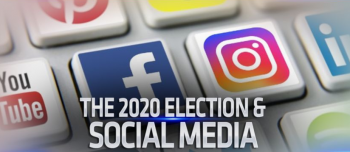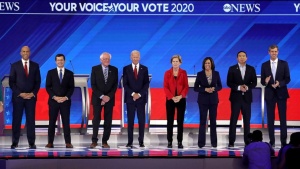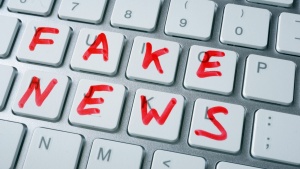Social media and the 2020 US presidential election
Contents
Use by Politicians
As of Dec 19, 2019, candidates have been using a variety of social media platforms and deliver different types of messages depending on the platform. The candidates studied, at the time, were Donald Trump, Joe Biden, Bernie Sanders, Elizabeth Warren, Pete Buttigieg, Andrew Yang, Amy Klobuchar, Cory Booker, Tom Steyer, and Tulsi Gabbard. The most commonly used platforms, in order, are Facebook, Twitter, Instagram, and YouTube.[1]Facebook has mainly been used to reach out to the 25 to 49 age demographic. Candidates have used the site to gather political donations, sign supporters to email lists, and find new supporters. Trump and Sanders are the most active. [1]
Twitter has been used for the past several presidential elections, used ubiquitously by 2020 candidates, with spikes being detected around debate times. Trump has the most active account of all candidates. [1]
Instagram is less widely used, but still a factor in the election. It appeals to the younger voters, and is more adopted by supporters of Yang and Sanders. [1]
Youtube is used in a different manner than other social media sites. It is employed not only to appeal to the candidate’s base, but used as a persuasive tool, as well. It is used to deliver the candidate’s message to a large number of voters that may not be supporting them at the time. Further, it is used to encourage Americans to get up and vote. [1]
Sanders and Yang have had the most active social media use by followers, as their bases are younger in age and, therefore, more likely to use social media. [1]
Facebook Political Ads
According to a New York Times study, how Facebook ads are used vary widely from candidate to candidate. Most candidates are advertising more towards women, and many candidates are spending more on reaching an older audience. Biden is attempting to reach an older audience (born before 1975), whereas Sanders directs his Facebook ads towards a younger crowd (born in or after 1975). Between these two, a difference in the gender of their audience is seen, as well. Sanders's audience is split almost evenly between men and women, but about two thirds of Biden's audience is female. Neither of the targeted audiences of these two candidates accurately represents the projected universe of likely voters in the 2020 Democratic primary.[2] As messages may vary when a candidate is appealing to different demographics, a question of ethicality is raised when ads are being targeted to specific groups.
The importance of Facebook ads are robust, and is depicted in the amount of money allocated towards it. As of October 19, 2019, candidates have spent about $32 million on Facebook ads, which is more than they have spent on television ads. The 2020 election is the first presidential election where Facebook is publicly publishing how much candidates are spending and whom they are targeting.[1] As of March 27, 2020, Trump, Sanders, and Biden alone have spend more than $49 million on Facebook ads.[3]
Fake News
As with previous elections, 2020 is being impacted by fake news in social media. Facebook has been on the forefront of this impact. Watchdogs at Facebook has been on the forefront of uncovering hundreds of fake accounts aimed at disseminating fake news. Fake accounts have been traced back to various countries, namely Russia, Iran, and Vietnam. This election, a different type of fake news is being uncovered: deepfakes. Using AI technology, one can misrepresent how an event occurred.[4]Fake news is not limited to solely lies, it can present itself as misrepresentations of the truth. Targeting a certain audience that is susceptible to reacting a certain way, posts can be tailored to incite a certain reaction from the desired audience. While not necessarily a lie, fake news can disrupt the political process.[4]
Social Media Companies are responding to threats of fake news. Facebook is deactivating accounts, and twitter has prohibited most paid promotion of political content.[4]
Bullshit and the ethics of social media in the political process
According to philosopher Harry Frankfurt[5], the essence of bullshit is a lack of concern for the truth of a statement. This is employed as a tool to not necessarily deceive the audience, but to further the bullshitter’s agenda. This is most prevalently seen in fake news. While not always a lie, the bullshitter behind fake posts has an agenda in mind, and is attempting to change the audience’s way of thinking about a politician or their messages, whether or not they are using facts. This extends to politicians, as well. When ads are targeted to different demographics, messages may be altered. Depending on personal standpoint, one may argue that this is unethical to adjust a message based on to whom the candidate may be addressing. As previously stated, advertising money is not distributed proportionally amongst demographics. [2] This raises the question of whether it is ethically sound for political candidates to use social media as a tool to target demographics with a tailored message.
References
- ↑ 1.0 1.1 1.2 1.3 1.4 1.5 1.6 https://www.wsj.com/articles/presidential-candidates-take-to-social-media-11574942401
- ↑ 2.0 2.1 https://www.nytimes.com/interactive/2019/10/14/us/politics/democrats-political-facebook-ads.html
- ↑ https://www.facebook.com/ads/library/report/
- ↑ 4.0 4.1 4.2 https://www.investors.com/news/technology/fake-news-2020-election-puts-social-media-companies-under-siege/
- ↑ Frankfurt, Harry. "On Bullshit", 2008


